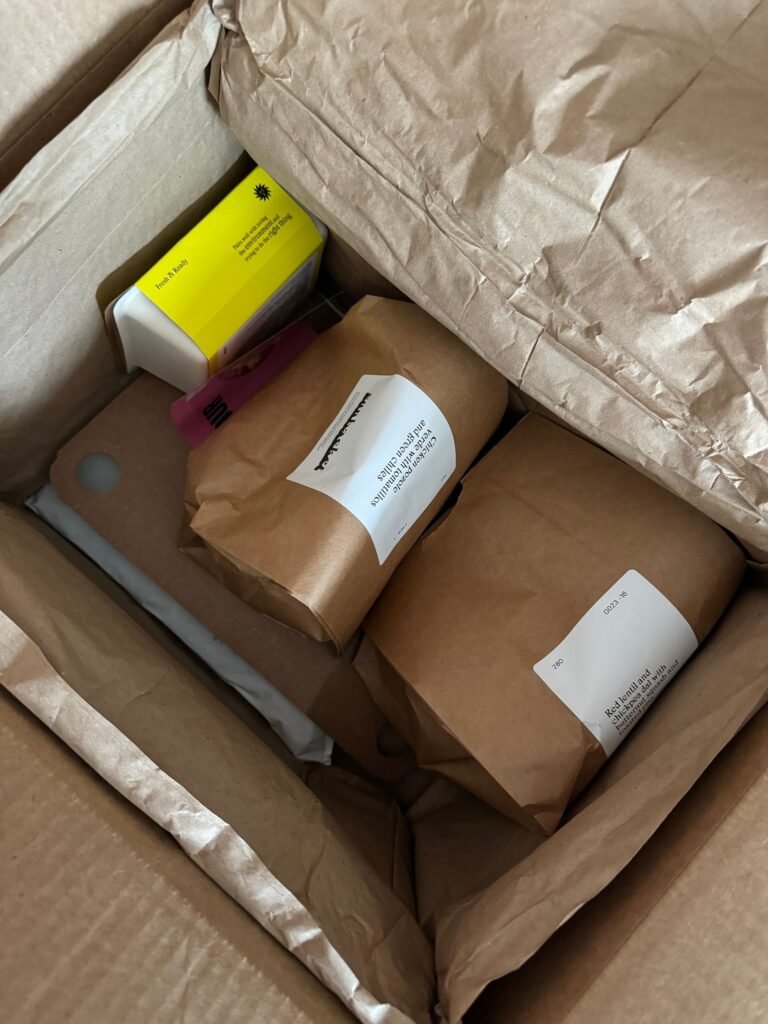
Mia Litzenberg
Deardra Westfall, owner of Nature’s 92, running a pop-up table at the Allen Farmers Market on Wednesday, March 19. Nature’s 92 also sells its sea moss food and body care products at the MSU Dairy Store.
Vibrant red EverCrisp apples, lush green curly kale, grow-your-own potted rosemary and a nutrition-savvy farmer are not what someone might typically expect to find in a former food desert.
The Allen Neighborhood Center is working to revitalize the Lansing Eastside neighborhood’s historical lack of access to diverse, nutritious foods by connecting local vendors to the community. One of the ways it does this is through its Allen Farmers Market every Wednesday, all year round.

Mia Litzenberg
The Hillcrest Farms stand at the Allen Farmers Market on Wednesday, March 19. Hillcrest Farms supplies freshly-picked, organic, and non-gmo produce to the Eastside community.
“It has made my life so much better; I’ve met so many more of our community members and the vendors that come here,” said vendor Joanna Wedding. “The patrons that come here have become my friends.”
Wedding is an Eastside resident and an assistant baker at Jerusalem Bakery, a Palestinian-owned business on Michigan Avenue. The bakery specializes in a variety of Mediterranean delicacies, from baklava to chicken shawarma.

Mia Litzenberg
Joanna Wedding, assistant baker at Jerusalem Bakery, oversees her table at the Allen Farmers Market on Wednesday, March 19. Their fresh-made pita is a popular pick.
“There’s never one way to describe this entire, incredibly diverse neighborhood,” said Ethan Schmitt, the volunteer and communications manager at Allen Neighborhood Center.
The Eastside is made up of multiple neighborhoods, where around 45% of residents are a racial or ethnic minority. The LGBTQ+ community also has a strong presence in the Eastside. In 2024, the Eastside had a 20.5% poverty rate, which is nearly double the national poverty rate at 11.1%.
“Our farmers market is a little bit different than other farmers markets in that we were the first to accept food stamps,” Schmitt said. “We also participate in Double Up Food Bucks, where if you’re using food stamps, your money goes twice as far at our market … because our neighborhood wouldn’t be able to participate in the farmers market if we didn’t have those measures.”

The Allen Neighborhood Center works to establish access to nutritious food in many other ways.
It has a free food pantry every Monday that specializes in perishable goods, a multi-farm Community Supported Agriculture Veggie Box program connecting farmers to the community, and an incubator kitchen that increases accessibility for people to start a food business.
The center also runs an urban farm down the street at Hunter Park. The urban farm serves as a you-pick garden and an educational center for community members to learn about growing and sustaining their own food.
“An urban farm that’s also like, specializing in growing different ethnic crops,” Schmitt said. “A big example is we’re growing African eggplant right now.”
Schmitt said the urban farm mixes indigenous-focused growing with reflecting the people in the community.
“We want to make them feel a little bit more at home,” Schmitt said.
The urban garden was strategically placed on the other side of Kalamazoo Street from the Allen Neighborhood Center.
“Kalamazoo Street can be a real barrier for people,” Schmitt said. “You get south of Kalamazoo Street, and you get a lot more poverty as well, because there was a highway that was built right through the area, and once it was designated as a floodplain, and you had to start paying extra money, property value started to really plummet. We wanted to make sure that we’re really serving that population as well.”
The Allen Neighborhood Center is physically connected to Allen Place, a mixed-income apartment building. The building complex also faced environmental challenges that threatened community health and economic outcomes. The property had historically been used for automotive and lawn mower businesses, a gas station, and a dry-cleaning business. This led to metal and chlorinated solvent contamination in the soil.
The Lansing Economic Development Corporation secured an $850,000 brownfield redevelopment grant through the Michigan Department of Environment, Great Lakes, and Energy (EGLE). This grant funded an investigation, removal of an underground storage tank, the disposal of contaminated soil and demolition. It also included the designing and installation of a vapor mitigation system, which helps prevent soil contaminants in the ground from entering the building.
This project supported the Allen Neighborhood Center’s mission to advance environmental, health, and economic outcomes. Having a safe space to run programs like the Allen Farmers Market is a big part of what brings the Eastside business and community members together.
“You talk with them, and sometimes you get their stories,” Allen Farmers Market patron Alexa Sutton said. “And they get yours.”


















